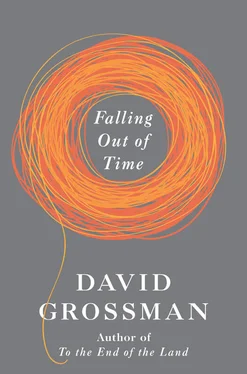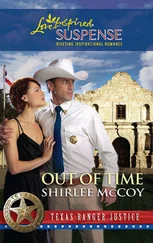losing
my son
once again.
TOWN CHRONICLER: Under a streetlamp that glows with a yellowish light stands an elderly man writing in chalk on the wall of a house. A white halo of hair hovers around his head, his walrus mustache is silver, and my soul alights when I realize it is my teacher, my math teacher from elementary school, a likable man who suffered a tragedy years ago, I cannot recall what, and disappeared. I thought he was dead, yet here he is, in the middle of the night, standing by a wall befouled with lurid pictures, writing columns of numbers and exercises in tiny, neat handwriting. When he notices me he does not seem alarmed at all: on the contrary, he gives me a toothless grin, as though he has been expecting me for a long time, and gestures with his crooked finger for me to approach the wall.
ELDERLY MATH TEACHER:
Two plus two
equals four.
Repeat after me:
three plus three equals
six. Ten plus ten — twenty.
You’re late again, my boy;
tomorrow you’ll have to bring
your parents.
TOWN CHRONICLER: But sir, don’t you remember me?
ELDERLY MATH TEACHER:
Excuse me, sir, excuse me.
The darkness, and my eyesight …
You are the town chronicler,
of course.
So: with regard to the question
that was posed, or about
to be posed,
I have so little to say,
and I myself
must wonder: after all,
for twenty-six years
this has been
the singular
greatest fact
of my life.
Yet surprisingly,
and embarrassingly,
I know nothing
about it.
“But what is it like?”
people ask,
and I, too, not infrequently,
ask myself:
Like a block of concrete?
An iron ingot?
An impassable dam?
Like basalt rock?
Or rather — like the layers
of an onion?
But no, I must apologize,
for it is none of those.
And do not think, sir,
that I am evading
the question:
I truly know nothing about it.
Just that it is here.
A fact. And heavily
it slumps
on all my days. And
sucks my life out.
And that is all.
Please forgive me,
more than that
I truly
do
not
know.
TOWN CHRONICLER: He turned his back on me and resumed writing numbers on the wall in his miniature handwriting. I stood watching him for several more minutes, drawing strange comfort from the ease and swiftness of his motions. Then suddenly I remembered what it was that had befallen him, amazed that I could have forgotten. I almost went up to him and said: Sir, such and such happened to me as well, and you never taught me what to do.
MIDWIFE:
A b-b-baby, one baby,
were he to emerge
from a womb into
my w-w-waiting hands,
my empty midwife’s
hands, still c-c-covered
with the dew of birth, still tied
at the navel, bleating—
except that
I do not know
whether at that moment
he might not c-c-crumble
in my hands
to dust—
But w-w-what
is that?
Your m-m-mouth,
what have you
done?!
COBBLER: It’s nothing. I don’t—
MIDWIFE:
Your m-m-mouth,
the m-m-mouth,
open
your mouth!
COBBLER: No, leave it, don’t touch, they give me all my power.
MIDWIFE:
And I never
n-n-noticed … How?
I th-th-thought
it was only when you
worked that you … And how
did you eat that w-w-way?
How anything?
T-t-take them out, please,
I beg you, take them
all out—
COBBLER: No, I can’t, who’ll protect me so I—
MIDWIFE: Take them out!
COBBLER: So I don’t bite me—
MIDWIFE:
Y-y-yes, more,
remove them, spit them, there are
more, and another,
yes, give them into my hand …
There are more, dear God,
it’s sharp … there’s blood,
your whole m-m-mouth
is sores and
rust.
TOWN CHRONICLER: She opens the window and throws them out. I hear metallic clangs as they fall around me. The cobbler stands there amazed, his hand on his cheek and his tongue roaming his mouth, probing the emptiness.
COBBLER: There were ten of ’em. The little ones and the big ones and the crooked ones, and a thick one with no head, what was like a thumb, I called it. They’ve been like parts of me. One for each of her tiny-tiny fingers I used to kiss.
TOWN CHRONICLER: That evening, the walking man hears heavy footsteps behind him, and there is the cobbler, slightly hunched, and he grunts out a question: Happen to need some shoes? The man says he doesn’t need anything, only to walk undisturbed. The cobbler looks at the man’s blistered feet and says he has, right there in his backpack, tools and a stretch of leather, and he can easily sew a fine pair of shoes. The man does not reply, and they keep walking a while longer. Finally, the cobbler asks if he may walk behind the man this way, and the man doesn’t answer, nor does he stop walking, just shrugs his shoulders as if to say: Do as you please, but I walk alone.
Now they are two, Your Highness. You can see them from your window. At the fore, the tall, thin man with unkempt hair and beard, and a few steps behind him, the cobbler, his arms hanging at his sides. Every so often he turns his head back to see the slender, upright woman in the hut window.
MIDWIFE:
But if
not,
if the b-b-baby does not
crumble to dust, if he stays
warm and s-s-solid,
wailing,
crying,
perhaps
the whole w-w-world
will return
to be mended
in my two hands?
WOMAN WHO LEFT HOME:
Five years after my son
died, his father
went out
to meet him.
I did not go
with him.
Atop a belfry
in the heart of the county seat
a hundred miles from home,
I walk alone now
in circles, around
a ferrous spire, slowly
slowly, around
and around, nights,
days,
in my tiny circle,
facing him,
while he
on the hilltops,
facing me, days,
nights,
orbits his
own circle.
CENTAUR: But if I don’t write it I won’t understand.
TOWN CHRONICLER: This, as though in passing, is what the centaur mutters at your chronicler, my lord, as I walk past his window in the evening hour — as I walk at your command, and under profound and turbulent protest .
CENTAUR: I cannot understand this thing that happened, nor can I fathom the person I am now, after it happened. And what’s worse, pencil pusher, is that if I do not write it, I cannot understand who he is now either — my son.
TOWN CHRONICLER: Nor do I understand what he is saying. And he, of course, does not explain. Only pricks up his nose in a proud and bombastic display of insult and turns his back on me as far as his ungainly body will allow. But he follows me from the corner of his eye, and as soon as I grow weary of his performance and turn to leave—
CENTAUR: That’s how it is with me, clerko, that’s how I’m built. No getting around it. I can’t understand anything until I write it. Really understand, I mean. Veritably! What are you looking at? Again with that waif face? I’m talking about actually writing, not just regurgitating what a thousand people before me have chewed up and vomited, like you are so fond of doing, eh, keeper of the notebook? Snooping, snipping, jotting down every single fart with your precious handwriting, eh? Well then, write this, please, in big letters, giant ones: I must re-create it in the form of a story! Do you get that? It , you idiot! The thing that happened! What’s not to understand? It! The sonofabitch thing that happened to me and my boy. Yes — mix it into a story is what I need to do, have to do. And it must have plots! And imagination! And hallucinations and freedom and dreams! Fire! A bubbling cauldron!
Читать дальше











